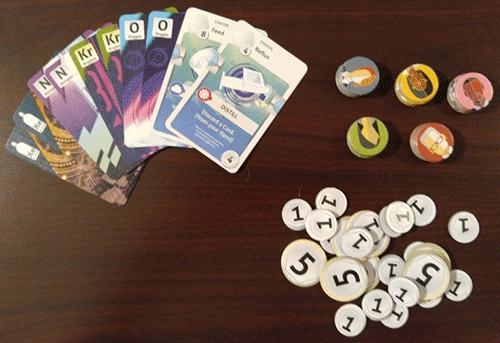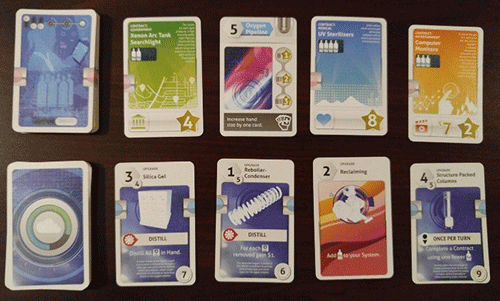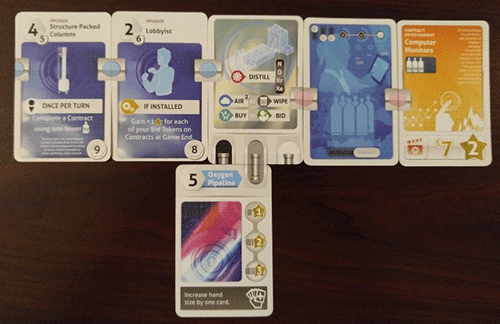Xenon Profiteer Review
on Jul 14, 2016
After Dominion came out in 2008, the deckbuilding mechanism became a staple among modern games. With the myriad of deckbuilding games that have been released since, it seems hard to imagine that there would be anything particularly new or innovative left to do with the mechanism. However, Xenon Profiteer proves that entirely wrong. What Xenon Profiteer does is flips deckbuilding on its head. This isn’t a deckbuilding game; it’s a deck-deconstruction game. That’s right. Instead of building up your deck, you’re trying to break it down. For those of you who have played the game Last Will, where you’re trying to lose money as quickly as possible, Xenon Profiteer has a similar feel as you try to wrap your mind around doing the reverse of what every other deckbuilder typically encourages you to do, which is get more cards. If you’re wondering how this can possibly work, it’s actually very smart and impressive how the game does this.
Over the course of the game, your hand keeps filling with air, which is comprised of four elements, represented by different cards that make up the majority of your deck. Among those elements is xenon, but you can’t get to it until you distill the other three elements by removing them from your deck. There’s some clever play that comes in as to manipulating your hand so as to leave the right elements in it at the right time. Then, you can start fulfilling contracts, which require a certain amount of xenon, and are one of the ways to score points. This sounds easy enough, but the twist is that you can’t get more xenon to use later on without getting more air. So there’s a continual cycle of getting air then getting rid of everything in it, only to get more air afterward for more xenon. This may sound tedious, but there are some upgrades you can get to make your distillation system more efficient.

Like other deckbuilding games, this is where there is some engine building as you try to continually dump the trash to get to the good stuff. However, unlike other deckbuilding games, you can never whittle your deck down enough where you just run it until the end game. In Xenon Profiteer, the necessity of introducing more air into your system, because you need more xenon, means you will never have a perfect deck without any trash. So, although there is some engine building in the game, it’s not nearly as much as in other deckbuilders. I know that for some people this is what they love or hate about the genre. However, there are enough decisions to be made as to which upgrade cards to purchase that your distillation system does become rather unique from your opponents’. Like any deckbuilding game, you start off small, but things ramp up quickly. The different kinds of upgrades may help you distill better, bid more, or even reduce the cost of contracts. Additionally, upgrades can either be installed into your system for permanent benefits at a higher cost or put into your deck to play when it comes up in your hand for a lower cost. You can even install that card you bought earlier at a later point once you have the money to do so, giving you a lot of flexibility in your turns.

Xenon Profiteer’s take on deckbuilding is not the only… element (see what I did there?) that gets a facelift. The game includes a unique take on bidding. Each player has five bid tokens that can be placed on cards to reduce the cost of purchasing them later on. What makes this unique is that just because you put your token on a card does not mean others can’t place theirs there too. In fact, any card you buy with an opponent’s token(s) on it means you have to pay them $1 per token. This means you can be pretty sneaky, horning in on someone else’s contract and getting a few bucks out of it, even if you don’t want it. What a jerk! Because of this, bidding is a bit nastier with more players. This isn’t entirely a bad thing. In a game where there isn’t a ton of interaction otherwise, this ensures that you’re paying attention to what your opponent is buying. When you start to see them zipping through those air packets, distilling xenon like a boss, you’re going to feel the tension because ultimately Xenon Profiteer is a race.

The game ends when someone builds five upgrades or five contracts. However, you can’t really have one without the other, meaning you can’t focus exclusively on just building upgrades or just fulfilling contracts because the two complement each other. This inherent balance in the game is really nice since the game would feel a bit bland with a singular focus otherwise.
Despite its relatively short playtime of 30-45 minutes, Xenon Profiteer really packs a punch. Turns are snappy once you get going, even for players who may be a little prone to deliberating and optimizing their turns. One thing to note: there is a limited amount of cards, which means the game might start to feel a bit same-y after a while. I would love to see some new cards added soon, just for variety’s sake. Although there is an expansion pack that offers individual player powers and three extra contacts, I’m not convinced those really add much to the already solid game, but I’ve never been one to get too excited over individual player powers anyway. For those who aren’t fans of deckbuilding, I'm not sure if it would necessarily change your mind about the mechanism, but Xenon Profiteer has a fundamentally different feel to it than your typical Dominion clone. So, don’t dismiss it on that alone. And for fans of deckbuilding, this is an absolute must-try game. Those fans will be pleasantly surprised by the twist on traditional deckbuilding and be glad to add it to their collections.

 Customer Support
Customer Support  Subscribe
Subscribe 




 Account
Account  Wishlist
Wishlist 
